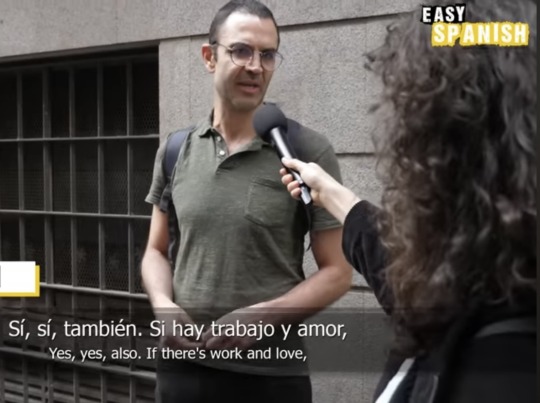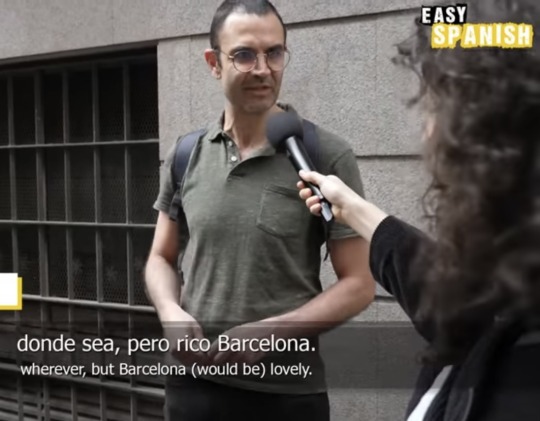#langblr espanol
Text

duolingo terrifies me actually. "safe"?? "any means necessary??" what does this mean duo??? what does this mEAN??11!1!!!1
#duolingo#languages#language learning#should probably start using it again ngl#this thing taught me everything i needed for my spanish gcse content last year#before i even got around to covering it in class#langblr#i'm scared <3#if i disappear one day#you know who to blame#foreign languages#me encanta aprender espanol con duolingo#por favor no me hagan daño#i think that's right??#probably an error in there somewhere#spanish
111 notes
·
View notes
Text
Resource List for Learning Spanish
Hi Language Enthusiasts,
Do you want to learn Spanish but don't know where to start? Then I've got the perfect resource list for you and you can find its links below. Let me know if you have any suggestions to improve it. I hope everyone can enjoy it and if anyone notices any mistakes or has any questions you are free to PM me.Here is what the resource list contains;
Handmade resources on certain grammar concepts for easy understanding.
Resources on learning pronunciation.
Websites to practice reading.
Documents to enhance your vocabulary.
Notes on Colloquial Language.
Music playlists
List of podcasts/audiobooks And a compiled + organized list of websites you can use to get hold of grammar!
https://docs.google.com/document/d/1e1FgmIAYscBqaEguiBGlMSPYivg5WJfKW3VcdNamZeE/edit?usp=sharing
#spanish#spain#madrid#barcelona#learn spanish#espana#espanol#language#language learning#language resources#languages#studyblr#langblr#linguistics#learn#espanyol#español#espanya#reading#learning#spanishlearn#spanish learning#latin america#mexico#south america#europe#argentina#peru
516 notes
·
View notes
Text
english - francais - espanol - patwa - deutsch 1 - 20
zero - zéro - cero - zéwo - null
one - un - uno - yonn - eins
two - deux - dos - dé - zwei
three - trois - tres - twa - drei
four - quatre - cuatro - kat - vier
five - cinq - cinco - sènk - fünf
six - six - séis - sis - sechs
seven - sept - siete - sèt - sieben
eight - huit - ocho - (y)wit - acht
nine - neuf - nueve - nèf - neun
ten - dix - diez - dis - zehn
eleven - onze - once - wonz - elf
twelve - douze - doce - douz - zwölf
thirteen - treize - trece - twèz - dreizehn
fourteen - quatorze - catorce - katòz - vierzehn
fifteen - quizne - quince - kènz - fünfzehn
sixteen - seize - dieciséis - sèz - sechzehn
seventeen - dixsept - diecisiete - disèt - siebzehn
eighteen - dixhuit - dieciocho - dizwit - achtzehn
nineteen - dixneuf - diecinueve - diznèf - neunzehn
twenty - vingt - viente - vèn - zwanzig
#english#francais#french#espanol#spanish#patwa#patois#french creole#deutsch#german#numbers#language learning#rien es studyin#langblr#studyblr
46 notes
·
View notes
Text
50 random words in Spanish
Surprise vocab list, why not?
el nacimiento = birth / source, origin / nativity (religious settings)
de nacimiento = from birth [e.g. sordo/a de nacimiento “deaf from birth” as opposed to deafness caused by something else]
destacar = to emphasize, to make something stand out
sombrío/a = grim, dismal, somber
el ayuntamiento = town hall (building) / local government, municipal government, city council
el comportamiento = behavior
atar = to tie
desatar = to untie
pudrir = to rot, to decompose
pudrirse = to spoil, to become rotten
abordar = to address (an issue), to tackle, to deal with
(mirar/ver) de reojo = to look sideways, to look to the side, to look (at someone/something) askance, to give someone a sideways glance, “to side-eye” or “to give someone the side-eye”
mirar/ver de reojo = “to see/watch/look at out of the corner of one’s eye”
a lo largo de = throughout, “over the course of”
la estrofa = stanza
la flecha = arrow
el alboroto = uproar, racket, noise
el edil, la edila = councilman/councilwoman, alderman, local city councilor in government
[also “edile” or “magistrate” in Ancient Rome if you’re watching/reading a historical thing]
anhelar = to yearn for, to long for
aleatorio/a = random / randomized
el lucro = profit
ánimo de lucro / fines de lucro = for profit [lit. “spirit / goals of profit”]
sin ánimo de lucro / sin fines de lucro = non-profit, not for profit
medir = to measure, to take a measurement, to take a reading (of machinery etc) / to gauge, to calculate / to consider
la etiqueta = tag, label, price tag / etiquette
el trébol = clover, shamrock / clubs (a suit in cards)
el muelle = dock, wharf, pier
los muelles = the docks
escoltar = to escourt, to guard
el/la escolta = escort, follower, companion / bodyguard, security detail, escort
el pueblo = a town
el pueblo = people, population, “citizens” or “inhabitants”
[e.g. el pueblo francés “the French people”, el pueblo mexicano “the Mexican citizens”; in some contexts it can translate as “nation” or “tribe” particularly for indigenous peoples or nomadic groups]
mayúsculo/a = upper case, capital / great, very large, important
la letra mayúscula = upper case letter, capital letter
en mayúsculas = in capital letters [sometimes used as “very important”, like un problema en mayúsculas is “a huge problem” or like “a problem with a capital P” idiomatically, but literally “a problem in capital letters”]
minúsculo/a = lower case / miniscule, tiny
la letra minúscula = lower case letters
en minúsculas = in lower case letters
el aprendizaje = learning / apprenticeship, training
la cuerda floja = tightrope
en la cuerda floja = on the tightrope [can also be understood to mean “walking a thin line” or “skating on thin ice”; meaning the situation is dangerous and “one wrong step” could be disastrous]
de bruces = “face down” / “flat”, “flat on your face”
caerse/darse de bruces = “to fall flat on one’s face”
marginado/a = marginalized
los marginados = outcasts, people who are ostracized, people who are treated badly by people/society, pariahs
el oído = inner ear / hearing, sense of hearing
[if you know Spanish anatomy words, la oreja “ear” is the outer structure or shape, and el oído “inner ear” is related to anything “hearing” related and the inner structure]
partidario/a (de alguien/hacer algo) = in support of, supporting (someone/doing something), a follower of (someone), in favor of
[ser partidario/a is often “to be a proponent of”.... but in politics or with a person it means “a (someone)-supporter”]
la zarza = bramble, briar, thornbush
el zarzal = bramble patch, patch of thorny bushes / blackberry patch
la zarzamora = blackberry bush
[lit. “dark berry thornbush”]
hacer malabares = to juggle
hacer malabares (con algo) = to juggle (something)
[could be objects could be tasks; el malabarismo is “juggling” as a noun though]
la infancia = childhood, infancy
el trastorno = disorder (in a medical sense)
a la deriva = adrift / aimless, aimlessly, without purpose
comprobar = to prove, to verify, to confirm
aislar = to isolate, to alienate, to keep separate
el paraíso = paradise / heaven
el afán = zeal, eagerness, effort
con (el) afán (de hacer algo) = “in the hopes of (doing something)”, “with the intention of (doing something)”, “with the goal of (doing something)”
la presión = pressure, strain / blood pressure
bajo presión = under pressure
ataviarse = “to be dressed up (fancy)”, “to be dressed to the nines” / “decked out”
el/la testigo = witness
agotado/a = exhausted, tired / exhausted, depleted, drained
los escombros = wreckage, rubble, debris
el casco viejo = historic center, historic district, old town
[lit. “old quarter”; generally you’re going to see el casco as “helmet” or “headphone”, but it can also mean “outer hull” of a boat, or “quarter” of a city/town]
la ilusión = illusion / happiness, excitement / “dream”, “desire” [used with tener]
el traje = a suit (like a business suit) / style of dress, regional dress, garb
renunciar = to quit, to step down, to leave
el esmero = care, effort, “time and effort”, attention
con (mucho) esmero = painstakingly, “going to great lengths”, “(taking) great pains”
295 notes
·
View notes
Text
does anyone have recommendations for Spanish horror novels?? literally any kind of horror, psychological or supernatural or whatever else. preferably B1-B2/intermediate level, but Id take anything right now. ideally something that was originally written in Spanish!!
#spanish#language learning#espanol#langblr#books#bookblr#spanish langblr#reading#book recommendations#please im desperate#text post#my rambles#horror#the community usually gives me better books than goodreads#spanish learning#learning spanish
14 notes
·
View notes
Text

#norwegian#norsk#learn norwegian#jeg lærer norsk#langblr#french vocab#french#Spanish#espanol#svenska#italien#learn english#english language#language learning#lang#languages#language#arabic language#learn arabic
54 notes
·
View notes
Text
i hv a cool idea for an ask game where you put simple or complex sentences your choice into someone's askbox and they translate it from memory in one sentence trying to make use of all the langs they know/are learning without searching for vocab etc and you can just default to your native langs for words you can't translate
e.g. 💌 - i listen to music while i eat chocolate
answer: mwen écoute la música pendant que mwen manjé schokolade
langs used: patois (french creole) french spanish and german
#langblr#ask game#language challenge#patois#french#spanish#german#deutsch#espanol#francais#french creole#cloud nonsense
11 notes
·
View notes
Text
fabrics in spanish (spain)
el algodón - cotton
el cachemir - cashmere
el cuero - leather
el encaje - lace
la gasa - chiffron
la lana - wool
el lino - linen
el poliéster - polyester
el satén - satin
la seda - silk
la tela vaquera - denim (literally cowboy fabric)
el terciopelo - velvet
32 notes
·
View notes
Text


estaban preguntando a la gente si preferirían vivir en madrid o en barcelona, y este hombre, casi sin pensar, dijo la cosa más profunda que he oído en mucho tiempo
#donde hay amor y trabajo... tiene razon no?#es muy sencillo#spanish language#espanol#españa#langblr#the lover speaks#quotes
3 notes
·
View notes
Text
Aprendo español actualmente
In order to hold myself accountable, I am posting on Tumblr to say that I am now going to be learning Spanish. I have no excuse - I am no longer at university and I am currently living at home. While commuting to and from work, I will have plenty of time to improve my Spanish!
20 notes
·
View notes
Text
Hola!
I’m Em, welcome to my new blog.
This will basically just consist of posts about language learning, but I’m also open to questions about my journey and language learning in general.
Languages I’m currently learning:
- Spanish/Español
I’ve been learning Spanish in school for 3 and a half years. If I’m being honest, I only began taking it because I felt it would help me in the future when applying to colleges. However, recently I started taking my learning more seriously, so I’ve been reviewing and such. I don’t understand really anything I should understand, but I will eventually. 🙏
- Korean/한국어
I’ve been self-studying Korean off and on since December 2022. I’m really into K-pop, K-dramas and Korean culture. I’m hoping to visit Korea when I graduate. It’s crazy but I understand more Korean than I do Spanish… 😅 I find Korean really fun and really easy (at least for now…) and I can’t wait to progress!
Anyway, that’s pretty much it. Thank you if you read through all of that, and thank you even more if you follow my journey!
If you have any questions or requests for posts, please feel free to send them!
안녕!! ^^
#language#korean#spanish#langblr#kpopidol#kpop gg#kpop bg#espanol#한국어공부#한글#studywithme#study hard#studyblr#study blog#languages#langauge learning#bilinguist#bilingual#trilingual#polyglot#thai singer#spanish music#korean langblr#spanish langblr#spanish language#korean language
5 notes
·
View notes
Text
I should really pick up Spanish again, very beautiful language which I am quite fond of, but the way of learning it through school was just not for me.
#langbr#Spanish#espanol#langblr#I could probably ask someone on the street about something but not much more practically#though I havent spoken it in a year or so#so I do not know for sure
4 notes
·
View notes
Text
Esto es mi blog para aprender español. ¡Puedes aydarme sí te ver errors! Gracias 💜
1 note
·
View note
Text
Learn a language with me for free! Duolingo is fun, and proven to work. Here’s my invite link: https://invite.duolingo.com/BDHTZTB5CWWKS4PCB26BB7MORY
Want to get some more friends on Duolingo tbh. Currently learning Spanish atm.
#duolingo#langblr#language learning#languages#plus i want some free duolingo plus too#and inviting friends is one of those ways to get free duolingo plus#spanish#espanol#español#espanyol#studyblr#dark academia#light academia
5 notes
·
View notes
Note
Hi, I always thought 'un viejo verde' was like a dirty old man. But I just heard 'verde' to mean a gossipy woman. Both of these were from Castillian Spanish, in Madrid. What's going on? And any idea why it's green? Thank you
un viejo verde is "a dirty old man"
However, there is an expression in Spanish poner verde which is "to criticize harshly" which is more like "to harangue"
And, ponerse verde a alguien means "to talk about someone behind their back" usually in the sense of negative gossip, so my guess is you saw it in that context. I haven't seen verde used as a "gossipy person", but ponerse verde does mean "to gossip" as its own little expression
ponerse verde as "to talk bad about people" or "to gossip about people" is pretty common
-
As for the origin, I'm not sure
In English, you sometimes hear the same expression just with "blue"
As in un chiste verde is a "dirty joke" but you might hear it as "a blue joke" or "blue humor", where "blue films" used to refer to pornography or something pretty raunchy
(A much older expression in English is "to cry blue murder" which today we say "to cry bloody murder" when someone is screaming really loudly)
verde in this context tends to mean "sexual" or "raunchy" or with jokes it comes out as "off-color jokes"
My best guess is that verde tends to mean fertility, and was sometimes related to older people that were still spry
If you hear the expression viejo verde or viejo rabo verde it means "an old guy who goes after younger women". And occasionally you see la vieja verde translated as "cougar" to mean an older woman who likes younger men
[Additionally you may see a "dirty joke" as un chiste colorado which means "a red joke", where colorado/a as "colored" refers to your face becoming flushed; so this at least makes sense, it's a joke that would make people blush or turn red]
-
No idea why we decided on blue or green though. My best guess is that ponerse verde a alguien "to talk badly about someone" possibly means something like "to paint someone as promiscuous" like "to act as if they are verde" which calls someone's virtue or reputation into question. But again, that's just my assumption
Again, not uncommon to use this kind of color idea in English. We also have the idea of "to paint someone" like "to paint someone as the villain" kind of has that same ponerse -ish feel to it
-
There are also different instances of words related to sexual things being linked to gossip. It's unrelated to verde but I'll share just because I like this linguistic journey:
Like, la alcahueta for women was originally "a mediator" or "go-between". This is from a time period where women weren't really supposed to be meeting with men without a chaperone or making arrangements to see men. That was handled by an alcahueta of some kind. In Romeo and Juliet, the Nurse character is an alcahueta type character
However, alcahueta was also sometimes known as trotaconventos which is "trots-to-convents"... where women were sometimes put into convents to prepare them for marriage or to keep their virtue safe etc not just for women to become nuns. When women were to be kept away from the world for whatever reason they might be put into a convent. A trotaconventos was a woman who might arrange meetings between the women in convents and men because, uh, life finds a way
So! The term alcahueta which originally meant "mediator"... came to mean "female pimp". But, it also in later days came to mean "a woman who gossips a lot", probably because they go from place to place talking to people
Fun!
-
There are TONS of color-related expressions in Spanish (just like in English)
As far as why verde is related to "sexual" or "raunchy", follows do you know? And have you seen verde as "gossip" outside of ponerse verde?
56 notes
·
View notes
Text
Spanish Langblr Question
Hi langblrs! I was wondering if it's possible to self study B1 or if I'm better off enrolling in a Spanish school? Any advice or tips? My only qualm with enrolling is the transportation cost...
1 note
·
View note